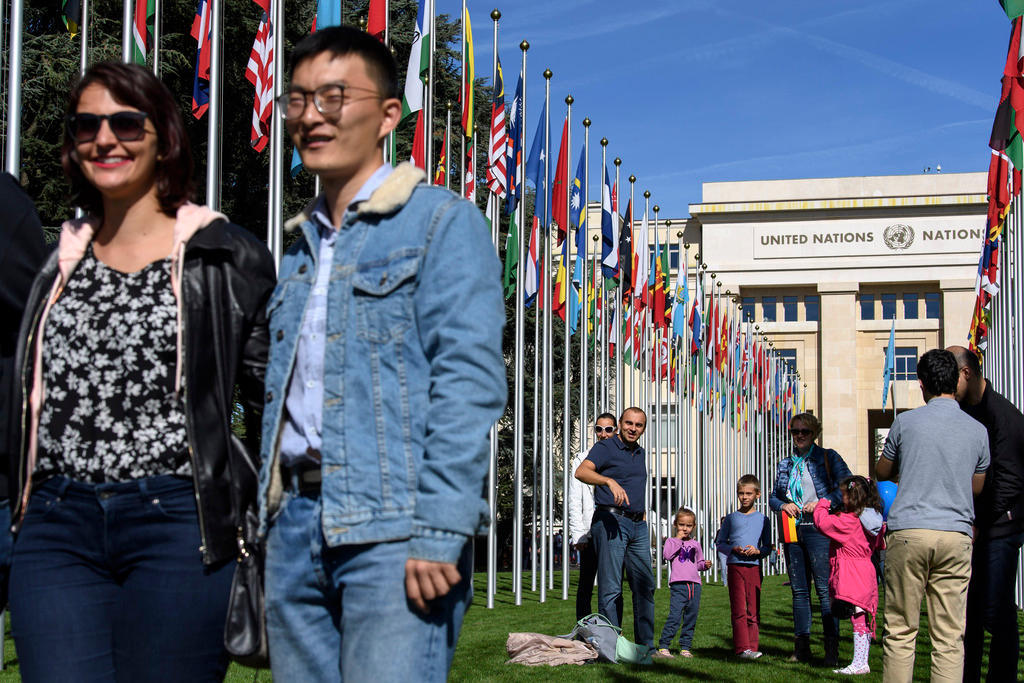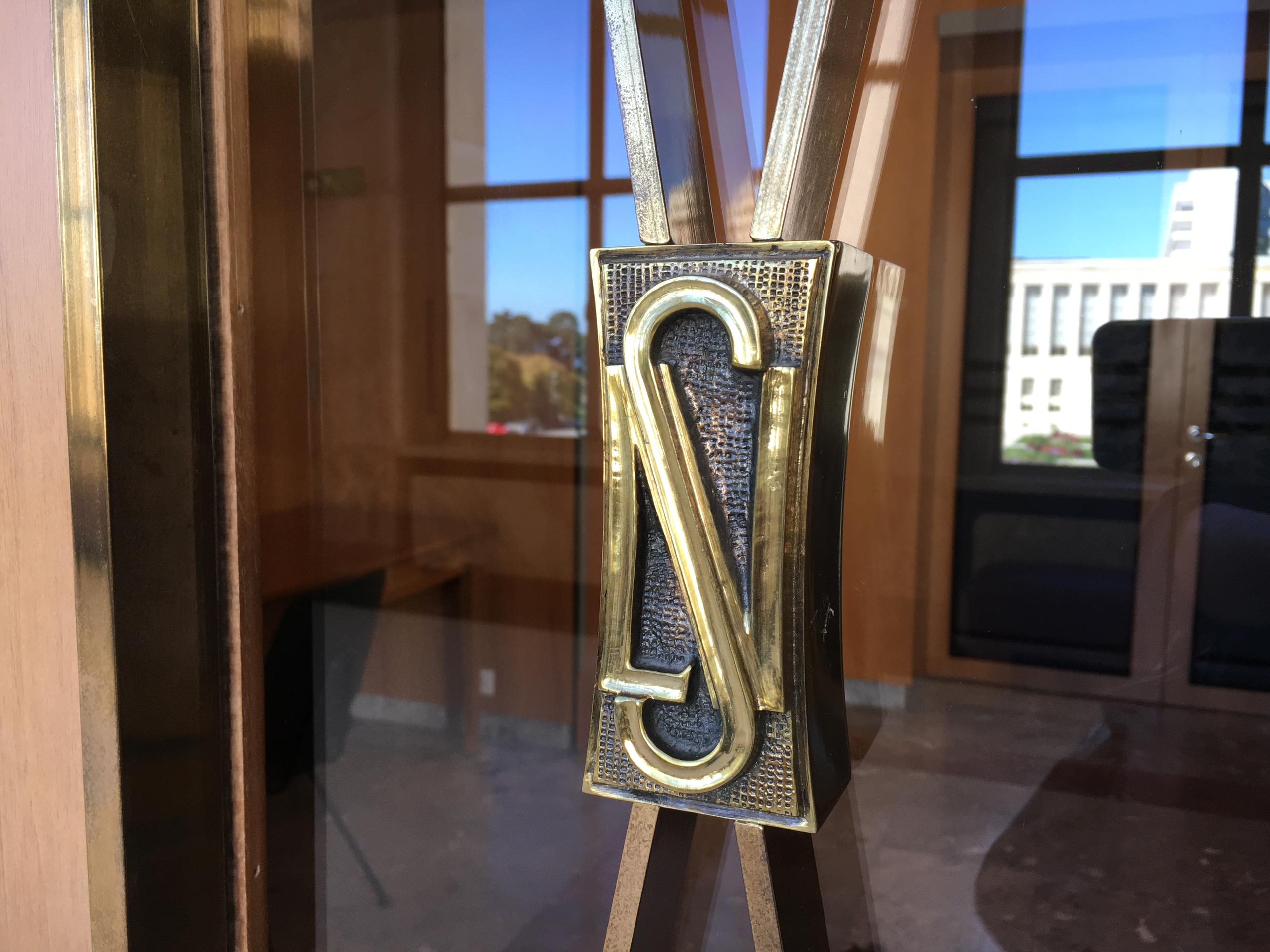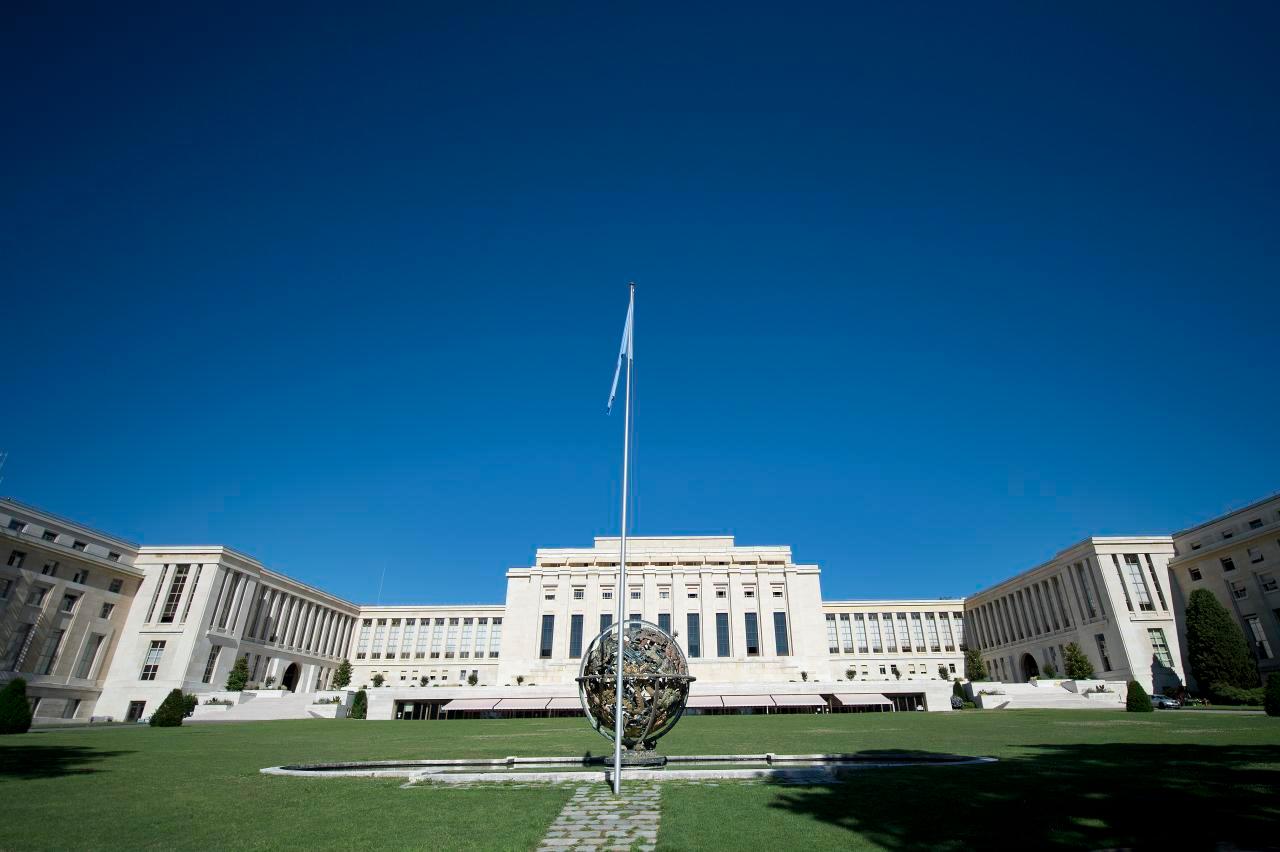How decisions in Geneva impact all of our lives

What actually takes place behind the scenes of the United Nations in Geneva? In a new swissinfo.ch series, longtime Geneva correspondent Imogen Foulkes provides insights into the often criticised institution, from the drama to the humdrum.
The United Nations in Geneva, known affectionately as ‘the Palais’, has been my place of work for over a decade. There is a danger, when you have become so familiar with a place over a long period, to get a bit blasé about it. The working days are full of meetings, press conferences, and deadlines. We Palais residents tend to scurry from one to the next, breathlessly racing, often, down the many kilometres of corridors.
But to really understand this Geneva landmark, and perhaps to regain some perspective about what we are actually doing inside the Palais, it is worth slowing down from time to time, and taking a careful look around.

Look, for example, at the door handles in the oldest part of the building, they are a carefully crafted art deco combination of the letters ‘L’ and ‘N’, reflecting the Palais’ original purpose as the League of Nations, created after the First World War with the hopeful intention of preventing wars altogether, by providing a venue for peace negotiations.
A sense of common purpose
Almost a century later that optimism looks wildly unrealistic, but when we sigh over the Palais’ endless meetings, when complaints get loud over UN bureaucracy, consider the words of the British author Vera Brittain when she first arrived at the League of Nations in 1923. Brittain, who had served as a nurse on the frontlines, and had lost both her fiancé and her brother in the war, was, she wrote, ‘indescribably moved by that sense of a common purpose.’
She, and many more who had been traumatised by the First World War, invested their hopes in the League of Nations. They believed that Geneva’s grand new institution might protect future generations from the horror and loss they had endured.
Today, says Michael Møller, Director General of the UN in Geneva, that sense of common purpose is still intact, and while he admits the goal of ending war altogether has not been achieved, he points out that “the UN in Geneva has prevented lots of wars: peacemaking, under the radar, is here all the time”.
Making peace day by day
Møller describes the Palais, and indeed Geneva today as an “international peace brand, a place where you come and talk, where you know people are not going to shoot at you, where peace is top of the agenda”.
On any given day, in the Palais multiple agencies, committees, working groups, and an estimated 10 to 12,000 staff members are engaged in what, essentially, is peace support, and peace building. Strolling around the Palais this month you will find meetings on transnational corporations and human rights, or a working group on the transport of perishable foodstuffs.
Hop over to the Palais Wilson and the home of the UN Human Rights Commissioner, and there’s a committee examining ways to prevent women being discriminated against under the law.
And over at the International Telecommunications Union the ITU has teamed up with the World Meteorological Organisation, or WMO, to examine the potential of radio spectrums to predict and monitor weather, water and climate.
Already, reading the last couple of paragraphs, I fear some readers may also be feeling, like I do sometimes, a bit blasé. But wait, dry as they sound, the meetings I’ve just listed are fundamental to our quality of life: rights for women, safe, fresh food supplies, new technology that can predict faster and more accurately when an extreme weather event is coming our way.
“Geneva is not a talking shop,” insists Møller. “It’s an acting shop. The human race is better off today than it has ever been.
“We have never lived longer, been healthier, been better educated, all human indicators are better, and the goals for achieving that are set in Geneva.”
Geneva: behind the diplomacy
So over the next few weeks I want to bring you some of the stories behind the daily diplomacy, the standards we take for granted, and the hard graft of an emergency response to a humanitarian crisis.
I’ll be going behind the scenes at upcoming Syria peace talks to see how they work, and whether, given the big geopolitical players involved, and the continued fighting on the ground, Geneva’s determinedly low-key diplomacy can be successful.
I’ll be looking at some new Geneva thinking on how to ensure war criminals are brought to justice.
I’ll be visiting OCHA’s (UN coordination for humanitarian relief) operations centre, deep in the basement of the Palais, to take a look at how a major relief operation is executed.
I’ll be talking to aid workers about to head off on mission, to places many of us would, if we are honest, much rather avoid.
I’ll be looking at some history, and its impact on our lives today: did you know, for example, that the world’s first ever summit on terrorism was held here in Geneva way back in 1937?
And I’ll be examining some of the newer, and lesser known, UN activities, such as the big push to establish standards for cybersecurity.
Finally, I’ll be listening to your feedback. What would you like to know about the UN in Geneva? Let me know, and I’ll do my best to find out!
You can follow Imogen Foulkes on twitter at @imogenfoulkes, and send her questions and suggestions for UN topics.

In compliance with the JTI standards
More: SWI swissinfo.ch certified by the Journalism Trust Initiative













You can find an overview of ongoing debates with our journalists here . Please join us!
If you want to start a conversation about a topic raised in this article or want to report factual errors, email us at english@swissinfo.ch.